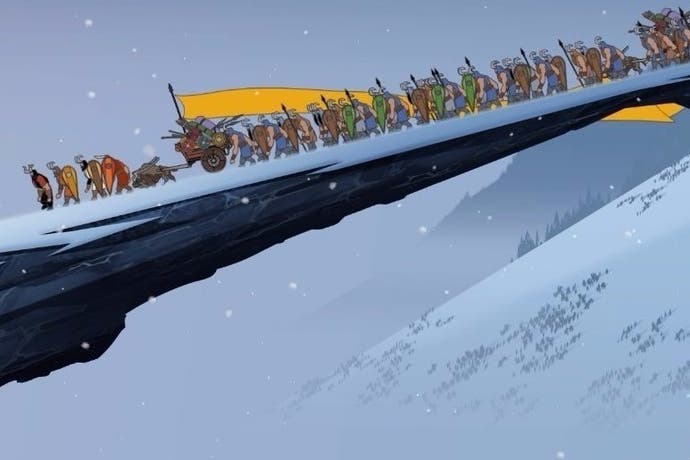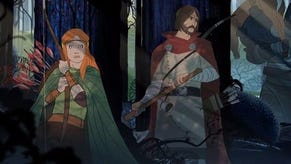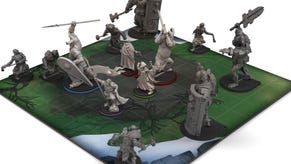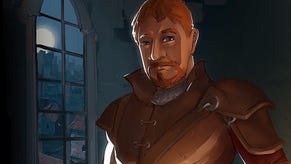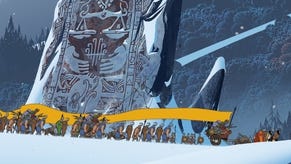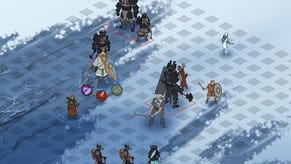The Banner Saga console review
Norse to see you again.
I'm not sure why it's taken two years since The Banner Saga's debut on computers for this handsome, world-weary tactical role-player to arrive on consoles [edit: Bertie points out to me that it's because the developer's original partner for the port folded]. But if, like me, you've let it pass you by, its appearance on Xbox One and PS4 this week presents a welcome excuse to catch up before a second instalment is released later this year.
The Banner Saga belongs to that first wave of games that attracted significant funding on Kickstarter by appealing to players' nostalgia. Unlike many others, though, the developers Stoic, with roots at BioWare, didn't make a promise to resurrect or spiritually succeed a particular fondly remembered classic or moribund genre. Instead, it offered an original cocktail of references: Norse myth, apocalyptic fantasy, 1950s Disney art (the end credits - and one character name - pay tribute to Sleeping Beauty stylist Eyvind Earle), grid-based tactical combat, and - perhaps the key component - the classic survivalist text adventure about pioneer life, The Oregon Trail. The end result feels like something remembered (the game's tone and illustration style recall, for me, the wonderful World Mythologies books of my childhood) while being, in fact, refreshing and novel.
In a fantasy land with a strong viking flavour, humans have made a fairly stable peace with Varl, a race of horned giants who live for hundreds of years but can't reproduce. (The Varl were created by the gods, but the gods are now dead.) Threatening both is an army of stone men called the Dredge, who have lain dormant since the last great war but are now pouring forth from the north, driving people and Varl alike from their homes. There's a still more worrying sign: the sun refuses to set, hanging low and immobile in the sky, day and night. I loved the eerie, counter-intuitive terror of this idea, and wish the game had made more of it, but it sets the scene perfectly.

This, then, is a game about the end of the world. And I do mean about it, rather than just using the apocalypse as a motivation or a dramatic backdrop. It is happening in real time, and is being wrought by forces much greater than you; food is running out and people are turning on each other; it doesn't seem like the end can be averted, only outrun. And so it proves, in this episode at least (two more are planned). Taking maybe a dozen hours to complete, this part of the tale ends with a suitably hard-won victory, but you've done no more than keep the wolf from the door.
Indeed, the arc of the game is surprisingly bleak - though it's a credit to the humane writing, the lustrous artwork and Austin Wintory's superb, haunting music that The Banner Saga never gets oppressive, and remains romantically inviting throughout. We begin hopping between Varl and human protagonists, getting some political background on this world, before settling on the view from ground level: a caravan of survivors from a human settlement, reluctantly led by the local huntsman, his daughter and his Varl friend, trying to find safe harbour in a world where no such thing exists. Sometimes you stay put for a while, but mostly you have to keep moving. Either way, the clock is ticking, supplies are dwindling, and the only thing worse than acquiring more mouths to feed is losing them because you haven't been able to feed them.
This is the Oregon Trail part of the game, and it's the best part. As you move from place to place, you're confronted with unheralded incidents and choices - usually described in lucid text that you can readily picture in your mind's eye. A supply cart bolts for a cliff; two disreputable step-brothers each claim the other is terrorising a barricaded town; a weird old man, speaking in riddles, asks to join your caravan; you happen across bandits holding peasants to ransom, and they offer you a few days' supplies to look the other way. The choices are many, subtle and agonising, while the results are unpredictable and sometimes not felt for a while. You can lose major characters and playable members of your war party this way, but more often, you're choosing between doing the right thing and keeping people alive - as if that weren't doing the right thing.
With luck and good judgement, you can do better in some playthroughs than others, but the game is essentially rigged: times get tougher, and you will really start to feel the squeeze towards the end, however expertly you lead. The Banner Saga brilliantly evokes the agony of a leader facing no-win situations as society falls apart around him.
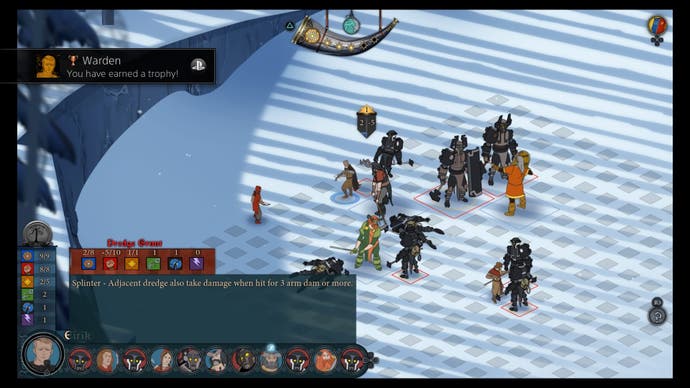
When it comes to combat scenarios, the game isn't quite so forceful in its ideas. The tactical combat is elegantly balanced and has a lovely, recursive conundrum at its centre: the strength stat is both hit points and damage, so the more hits you take, the less damage you do. Damage is mitigated by armour, and you can choose whether to go for an enemy's strength or weaken its armour. But while many special abilities are based around placement, the unvaried, open battlefields, the number of units involved and the pace of combat don't really encourage that kind of strategy, and fights are often scrappy and unfocused.
What's more pleasing is how the combat, and the simple upgrade paths for your characters, are tied into the narrative frame. In another clever synthesis, "renown" gathered from combat and story scenarios serves as both XP and currency. Do you spend it on upgrading your characters, buying trinkets for buffs, or getting supplies to keep the caravan alive and morale high? High morale means more willpower, a stat which enables you to move further, do more damage and use special abilities more frequently in combat.
Though they're securely linked, The Banner Saga's tactical and narrative personalities never mesh perfectly. In such an uncompromising survival story, it surprised me that characters aren't killed in combat, only suffering a few days' debuffs if they're defeated. The "war" system, in which the outcome of your personal battle affects the number of warriors lost in an unseen larger conflict, is fuzzily defined. Your political and moral decisions seem to carry a lot more weight than your military ones, and as the painful dilemmas of a collapsing world come into ever sharper focus, battlefield tactics don't significantly evolve. I'd certainly like to see some terrain variations and new enemy behaviours force more tactical play in future episodes.
Still, this is a rewarding and unique adventure. As scripted as it is, it summons the spirit of tabletop role-playing as well as any recent game I can think of: the sense that anything can happen, and every heart-in-mouth choice is irrevocable. It also conjures a compelling fantasy with eloquent economy from just a few lines of text and simply animated illustrations - a world that lives in your imagination as vividly as on the screen. Roll on the continuation of this saga.
